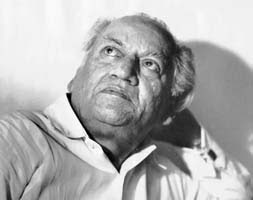Three ghazals posted. Two of them about oppressive apathetic leadership and one about personal losses. Now wait a minute, wasn't ghazal supposed to be about "love"? Traditionally major if not sole subject of Ghazal has been - Amor, love. Then why does first 3 posts of this blog shy away from this main stream theme of most ghazals? Like most things about me, this has not been by design. But loss and chaos has been in the air so much last 4-5 weeks were having their effect on whatever ghazals I was reading or listening to or remembering. Hence the themes.
Now to explore the topic further, we will discuss a ghazal that addresses this very subject - The Subject of a Ghazal.
Javed Akhtar at heart is a rebel. From
introducing the concept of angry-young man in Indian cinema to writing umpteen no. of shayaris about a seething hungry anger within Javed has kept the rebel alive. This one is about his dilemma. Should I dare to tell the truth or should I lie? Should I fail the tradition?
Shall we set a precedent?
किन लफ्जों में इतनी कड़वी इतनी कसिली बात लिखूँ
शेर की मैं तहजीब निभाऊ या अपने हालात लिखूँ
Kin lafzon me itni kadvi itni kasili baat likhu
sher ki main tahzeeb nibhau ya apne halaat likhu
How can I write about such bitter things? Should I follow the tradition of Poetry (write about only beautiful things) or should I write (the truth) about our (not so beautiful) situation.
ग़म नही लिखूँ क्या मैं ग़म को, जश्न लिखूँ क्या मातम को
जो देखे है मैंने जनाजे क्या उनको बारात लिखूँ
Gham nahi likhoon kya main gham ko, jashn likhoon kya maatam ko
Jo dekhe hai maine janaze kya unko barat likhu
Should I dress up sorrow as happiness, should I describe the mourning as a celebration? Funerals that I have seen, should I call them wedding parties?
कैसे लिखूँ मैं चाँद के किस्से, कैसे लिखूँ मैं फूल की बात
रेत उडाये गर्म हवा तो क्या उसको बरसात लिखूँ
Kaise likhu mai chand ke kisse, kaise likhu mai phool ki baat
Ret udaaye garm hava to kya usko barsaat likhu
How can I write about moon and flowers (in these times)? When hot winds throw up hot sand (at me) should I pretend it is rain? (In a more coarse manner, Manoj Bajpai expresses the same though in a movie - Wo hum pe mute aur hum baarish samajh ke naache, kya?)
किस किस की आंखों में देखे मैंने ज़हर बुझे खंजर
ख़ुद से भी जो मैंने छिपाए कैसे वो सदमात लिखूँ
Kis kis ki aankhon me dekhe maine zahar bujhe khanjar
Khud se bhi jo maine chhipaye kaise vo sadmaat likhu
(how can I describe) In how many eyes I have seen venomous daggers? How can I recount the horrors I have not acknoledged myself even?
तख्त की ख्वाहिश, लूट की लालच, कमजोरों पर ज़ुल्म का शौक
लेकिन उनका फरमाना है, मैं इनको जज़्बात लिखूँ
Takht ki khwahish, loot ki lalach, kamzoro par zulm ka shuak
Lekin unka farmana hai, main inko jazbaat likhu
The desire of throne, the greed of loot, the hobby of oppression (is the reason for all
their actions) But they (the powers that be) command me to describe these as tender feelings.
कातिल भी मकतुल भी दोनों नाम खुदा का लेते थे
कोई खुदा है तो वो कहाँ है मेरी क्या औकात लिखूँ
Qatil bhi maqtul bhi dono naam khuda ka lete the
koi khuda hai to wo kahaan hai meri kya aukaat likhu
The victim and the murderer both were praying to the (same) God! If there is a God where was he? (why didn't He intervene?) What chance (at stopping this massacres) I have (if He refrains from interfering)?
अपनी अपनी तारीकी को लोग उजाला कहते है
तारीकी के नाम लिखूँ तो कौमे फिरके जात लिखूँ
Apni apni tariqi ko log ujhala kahate hai
Tariqi ke naam likhu to kaume firake zaat likhu
Communities, ethnicities or religions are but mere shadows (dividing humanity) but everyone thinks of their own shadows as the Light
जाने ये कैसा दौर है जिसमे ये जुरअत भी मुश्किल
दिन हो अगर तो उसको लिखूँ दिन, रात अगर हो रात लिखूँ
Jaane ye kaisa daur hai jisme ye jurat bhi mushkil
Din ho agar to usko likhoon din, raat agar ho raat likhoon
In such times even calling the day 'a day' and the night 'a night' is also full of dangers.
On your feet ladies and gentleman. Similar feelings are being expressed by the God himself. I mean Ghalib ofcourse. And this sher also exeplifies why He commands the respect he does in the world of Urdu ghazals!
लिखते रहे जूनून की हिकायात-ऐ-खूनचकां
हरचंद इस में हाथ हमारे कलम हुए
Likhate rahe junoon ki hikayat-e-khoon-chakaan
Harchand is me haath hamare qalam hue
First meaning is simple enough - I kept on writing the blood-drenched stories of obsessions. That led to our hands being cut down(kalam hue). The meaning lurking behind this one that haunts you later is - (The hands have been cut down and hence are dripping with blood. With this blood) I kept on writing (blood drenched becuase written with bloodied hands) stories of obsession, and during the process my hands were used as a writing instrument - a kalam.






